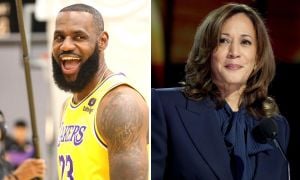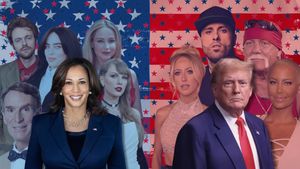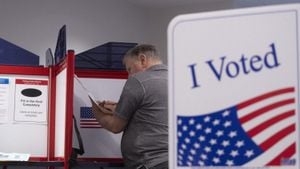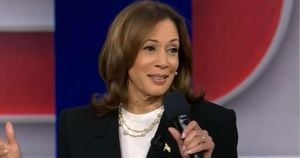Jennifer Lopez took to the stage at a Las Vegas rally on Thursday to endorse Vice President Kamala Harris, passionately denouncing former President Donald Trump for comments made by comedian Tony Hinchcliffe during one of Trump’s rallies. Hinchcliffe had insultingly described Puerto Rico as "a floating island of garbage," sparking outrage from various groups across the country.
Lopez, who proudly identifies as Puerto Rican, expressed her deep offense at the remarks, stating, "At Madison Square Garden, he reminded us who he really is and how he really feels. It wasn’t just Puerto Ricans who were offended. It was every Latino in this country. It was humanity and anyone of decent character." With these words, she rallied support not only for Harris but also against the kind of divisive rhetoric and policies she associates with Trump.
Hinchcliffe's joke at the Republican rally was criticized widely, prompting responses from notable figures including Bad Bunny, Ricky Martin, and Aubrey Plaza, all standing against the derogatory portrayal of Puerto Rico and Hispanic communities. Following the uproar, Nicky Jam even retracted his support for Trump, highlighting the backlash Trump's campaign is facing.
Lopez introduced herself at the rally as "an American woman" who is proud of her heritage. "I am Puerto Rican, and yes, I was born here, and we are Americans," she declared. This assertion served as both her personal identity and as part of her broader criticism of Trump's attitude toward Latino communities. She elaborated on the broader ramifications of Trump's divisive comments: "I like Hollywood endings. I like when the good guy – and, in this case, the good girl – wins."
Trump, meanwhile, has attempted to distance himself from Hinchcliffe's remarks. He claimed ignorance about the comedian, telling Fox News anchor Sean Hannity, "I don’t want anybody making nasty jokes or stupid jokes, and probably he shouldn’t have been there, yeah." This response has done little to quell the storm of criticism directed at his campaign, especially from those who feel targeted by such derogatory comments.
At the rally, Lopez's endorsement of Harris was not just about supporting one candidate over another. It was about an urgent call for voters to recognize the impact of their choices this election season. Lopez emphasized, "Our pain matters," advocating for the significance of Latino voices and experiences within the broader political conversation. She framed her support as part of a shared effort to uplift marginalized voices and demand accountability from political leaders.
Lopez's endorsement is part of a growing trend of celebrity activism, where influencers use their platforms to speak out on political issues. Harris has garnered support from various A-list personalities, including Taylor Swift and Beyoncé, as she campaigns for the upcoming election. The backing of prominent figures like Lopez is seen as pivotal for Harris's outreach efforts, particularly within minority communities.
The Las Vegas rally has become another defining moment in the narrative surrounding the 2024 election, showcasing how entertainment and politics intertwine. Lopez's passionate criticism of Trump juxtaposed with her strong endorsement of Harris highlights the stakes involved for Latino voters and the urgency of participating in upcoming elections. With less than a year until Election Day, every rally, every statement, and every celebrity endorsement is shaping the political battleground.
While Lopez’s remarks resonate through the political stratosphere, the question remains: will this celebrity support translate to mobilized voters? The impact of these endorsements, both from cultural icons like Lopez and the notable backlash against Trump, is yet to be fully realized. But one thing is clear: as the political climate heats up, voices from Hollywood and beyond are making it known where they stand.
Lopez’s stance serves as a rallying cry, urging all constituents, especially Latino voters, to reflect on the power of their voices and votes this coming election season. With significant personalities weighing in on pressing issues, the intersection of culture and politics continues to evolve, indicating just how much dialogue shapes public opinion and action.



